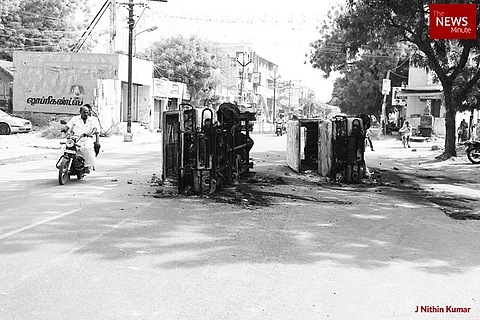

The mortuary at the Thoothukudi General Hospital was deserted on Tuesday night. Though the bodies of 11 people, who had died in police firing during the massive protest earlier that day against the Sterlite Copper Plant in the district, were inside the mortuary, families had not been allowed near them.
At the Intensive Care Unit ward of the hospital, families of the injured were seen everywhere, on the stairs and sitting on the floors, eagerly awaiting news about their relatives.
According to the hospital, 70 people were rushed there with injuries, many with bullet injuries.
28-year-old Prilston's mother Uduma was waiting outside the operation theatre, praying fervently. The family from Mellipuram was in shock as doctors had said that Prilston's leg, that sustained bullet injuries, may have to be amputated.
Uduma (Right)
"My son was not even part of the protest. Why did the police shoot him?" asks Uduma.
Thousands of protesters had marched for 6 kilometers from the VVT junction in Thoothukudi town to the Collectorate on Tuesday. The police force, clearly outnumbered, tried to stop them at many points using barricades, lathi charge and tear gas.
But each such instance angered the crowd more and eventually they entered the Collectorate, and that's when the firing started.
After the police firing, many were rushed to the Nalathambi hospital just opposite the Collectorate, but eleven people could not be saved.
Police had also opened fire at protesters from Threspuram fishers village, near the SP office in the afternoon.
At the hospital, Silvai and his wife Manimalar from the Threspuram village were waiting outside the ICU. Silvai's 20-year-old brother Sinthastin had been shot on the leg.
"They shot a small boy and a 43-year-old woman too in our village. The police are supposed to give us protection. We never imagined that they would kill us. Right from the morning, police did not even allow us to step out of house. We had strengthened our protest after a nine-year-old from our area died of cancer recently," Manimalar says.
Silvai had been at the Collectorate with the other protesters. "The protest was largely peaceful. We entered the Collectorate and asked for permission to meet the Collector. He should have agreed to meet us. Instead in minutes we saw police firing at us," Silvai says.
Krishnakumari's 18-year-old son Raja Singh who had been shot at was also getting operated on. "We live near the by pass road and my son was watching the protest from outside. Without any provocation the police resorted to fire. My son is an innocent victim. He was shot in the leg," she says.
Krishnakumari
The staff at the Thoothukudi Government were struggling to manage the situation as worried families kept pouring in. Tensions had escalated in the afternoon as police did not allow families to enter the hospital premises, and resorted to a round of firing in the evening as well.
"27 people have been admitted with bullets in their bodies. We can't blame the doctors. They did what all they can. We are fisherfolk, we won't be able to go back to work for days, our families will starve. As of now we are sitting in the hospital with not enough money to even buy a packet of milk," Manimalar says.
Lionel Antony Raj, Madurai district Secretary of People's Rights Protection Centre says the police resorted to lathicharge thrice, but could not restrain the determined crowd.
"The protesters were from villages and the town. The protest began in the morning, it was peaceful. There were two protests, one at the Old Bus Stand and the other was the Collectorate march. The two groups merged at some point. Police fired tear gas shells at the Highway Bridge near the Collectorate. At the time when the police used tear gas, there was no provocation from the protesters initially. No one knows who gave the orders for firing. In such situations, if the police are forced to act, they should first use tear gas, then water cannons, lathicharge, then a warning through loudspeaker, and even if forced to fire it should be below the knee. Here the police have violated all this. The Collector is responsible for this. Why did he give the permission for the police to enter the premise?"